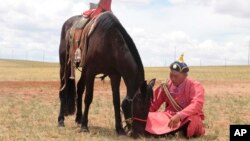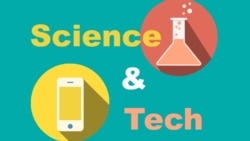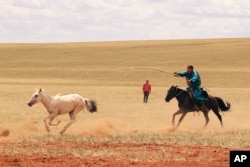The horse changed human history. And now scientists have a clearer idea of when humans began to change the horse.
Around 4,200 years ago, one particular lineage of horse quickly became dominant across Eurasia. That is when humans started to spread domesticated horses around the world, says research published Thursday in the journal Nature.
There was something special about this kind of horse. It had a genetic difference that changed the shape of its back, likely making it easier to ride.
“In the past, you had many different lineages of horses,” said Pablo Librado. He is an evolutionary biologist at the Spanish National Research Council in Barcelona and co-writer of the new study. The genetic diversity is evidenced in ancient DNA from archaeological sites across Eurasia dating back as far as 50,000 years.
But, this study of 475 ancient horse genomes showed a notable change around 4,200 years ago.
That is when one lineage first came about in what is known as the Pontic-Caspian Steppe. The area goes from what is now northeastern Bulgaria across Ukraine and through southern Russia. The lineage began to show up all across Eurasia and quickly replaced other lineages. Within three hundred years, the horses in Spain were similar to those in Russia.
“We saw this genetic type spreading almost everywhere in Eurasia,” said co-writer Ludovic Orlando, of the Centre for Anthropobiology and Genomics of Toulouse in France. Orlando added that this spread from one place to worldwide was very quick.
The researchers believe that the change began with the people called the Sintashta, who had domesticated their local horse population. They started to use these horses to help them greatly expand their territory.
Domesticating wild horses on the plains of Eurasia was a process, not a single event, the scientists say.
Earlier studies of ancient teeth remains found evidence that humans drank horse milk around 5,500 years ago. The earliest evidence of horse ridership dates to around 5,000 years ago. But it was the Sintashta who spread across Eurasia the kind of horses they had domesticated, the new study suggests.
Researchers believe the very earliest horse ancestors arose in North America. Then they spread across the Bering Strait into Asia around a million years ago. They did well in Asia, but went extinct in the Americas.
People had domesticated other animals several thousand years before horses. Animals like dogs, pigs, cattle, goats and sheep all came before horses. But the new research shows that the shrinking genetic diversity linked to domestication happened much faster in horses.
Humans changed the horse genome very quickly, “perhaps because we already had experience dealing with animals,” said Laurent Frantz. He studies the genetics of ancient creatures at the Ludwig Maximilian University of Munich and was not involved in the study.
“It shows the special place of horses in human societies,” he said.
I’m Caty Weaver.
Dan Novak adapted this story for VOA Learning English based on reporting by The Associated Press.
______________________________________________
Words in This Story
lineage — n. descent in a line from a common progenitor
domestic — adj. adapted over time (as by selective breeding) from a wild or natural state to life in close association with and to the benefit of humans
dominant — adj. commanding, controlling, or prevailing over all others
diversity — n. the condition of having or being composed of differing elements
genome — n. the genetic material of an organism










Forum